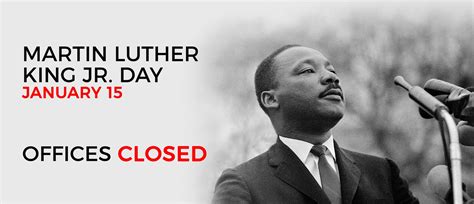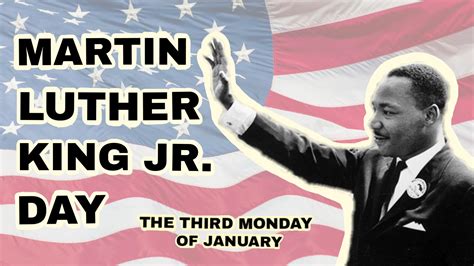Martin Luther King Day 2025

Martin Luther King Day, observed on the third Monday of January each year, is a federal holiday that honors the life and legacy of Dr. Martin Luther King Jr., a prominent leader in the American civil rights movement. As the nation prepares to commemorate this significant day in 2025, it is essential to reflect on the profound impact Dr. King had on the struggle for racial equality and social justice in the United States. With his powerful messages of love, nonviolent resistance, and hope, Dr. King inspired a generation of activists to work towards creating a more just and equitable society.
The legacy of Dr. King is multifaceted, with his influence extending beyond the realm of civil rights to encompass issues of poverty, education, and international peace. Through his leadership, Dr. King played a pivotal role in the passage of landmark legislation, including the Civil Rights Act of 1964 and the Voting Rights Act of 1965. These achievements, while significant, also underscore the ongoing struggle for true equality and justice, as many of the issues Dr. King addressed continue to affect communities today. As the country moves forward, it is crucial to acknowledge both the progress made and the challenges that remain, using Dr. King's vision as a guiding force for continued activism and reform.
Key Points
- Martin Luther King Day is a federal holiday honoring Dr. Martin Luther King Jr.'s life and legacy.
- Dr. King was a pivotal figure in the American civil rights movement, advocating for racial equality and social justice through nonviolent means.
- The legacy of Dr. King extends beyond civil rights, influencing issues such as poverty, education, and international peace.
- Despite significant progress, many of the challenges Dr. King addressed continue to affect communities, necessitating ongoing activism and reform.
- The commemoration of Martin Luther King Day in 2025 serves as an opportunity to reflect on Dr. King's impact and recommit to the pursuit of a more just and equitable society.
The Civil Rights Movement and Dr. King’s Leadership

Dr. King’s emergence as a leader in the civil rights movement was marked by his involvement in the Montgomery Bus Boycott, sparked by Rosa Parks’ refusal to give up her seat to a white person in 1955. This event, and the subsequent boycott that lasted for 381 days, ended with the U.S. Supreme Court ruling that segregation on public buses was unconstitutional. This victory was a significant milestone, demonstrating the power of nonviolent resistance and establishing Dr. King as a national figure in the fight for civil rights.
Throughout his career, Dr. King was guided by a strong commitment to nonviolence, inspired by the teachings of Mahatma Gandhi. This approach, though often met with violence and hostility, helped to galvanize public support for the civil rights movement, both domestically and internationally. The March on Washington for Jobs and Freedom in 1963, where Dr. King delivered his iconic "I Have a Dream" speech, is a testament to the movement's growing influence and the power of Dr. King's message. The speech, with its vivid imagery and call to action, has become an enduring symbol of the struggle for equality and justice, continuing to inspire generations of activists and leaders.
Legacy and Impact of Dr. King’s Work
The impact of Dr. King’s work extends far beyond his own lifetime. His commitment to nonviolent resistance has inspired movements for civil rights and social justice around the world. In the United States, the progress made towards racial equality, though imperfect, is a direct result of the foundations laid by Dr. King and other civil rights leaders. The election of Barack Obama as the first African American President of the United States in 2008, for example, was seen by many as a culmination of the efforts of Dr. King and the civil rights movement, highlighting the potential for profound social change through persistent activism and advocacy.
| Year | Event | Significance |
|---|---|---|
| 1955 | Montgomery Bus Boycott | Established Dr. King as a national leader in the civil rights movement |
| 1963 | March on Washington for Jobs and Freedom | Delivered "I Have a Dream" speech, a pivotal moment in the civil rights movement |
| 1964 | Civil Rights Act Passed | Outlawed discrimination based on race, color, religion, sex, or national origin |
| 1965 | Voting Rights Act Passed | Prohibited racial discrimination in voting |

Continuing Dr. King’s Work in the Modern Era

As the nation approaches Martin Luther King Day in 2025, it is clear that Dr. King’s work remains unfinished. Issues of racial inequality, economic injustice, and social injustice continue to plague communities, necessitating ongoing activism and advocacy. The Black Lives Matter movement, for example, has brought attention to systemic racism and police brutality, echoing many of the concerns Dr. King addressed during his lifetime. Similarly, efforts to restrict voting rights and the ongoing disparities in education and economic opportunities are reminders that the struggle for true equality is far from over.
Despite these challenges, the legacy of Dr. King offers a framework for addressing these issues. His emphasis on nonviolent resistance, community empowerment, and the importance of coalition building provides a powerful model for modern social justice movements. Moreover, Dr. King's recognition of the interconnectedness of social, economic, and political issues underscores the need for a comprehensive approach to creating a more just society. By drawing on Dr. King's vision and legacy, activists and leaders can work towards a future that more closely aligns with his dream of a world where everyone has the opportunity to thrive.
Practical Applications of Dr. King’s Principles
One of the most significant aspects of Dr. King’s legacy is its practical applicability. His principles of nonviolent resistance, for instance, have been successfully applied in a variety of contexts, from the anti-apartheid movement in South Africa to the struggle for democracy in Eastern Europe. In the United States, these principles continue to guide movements for social justice, emphasizing the importance of community-led initiatives and the power of collective action.
In addition to nonviolent resistance, Dr. King's emphasis on education and economic empowerment as tools for social change remains highly relevant. Initiatives aimed at improving access to quality education, promoting economic development in disadvantaged communities, and advocating for policies that address income inequality are all critical components of a broader strategy to achieve the kind of society Dr. King envisioned. By focusing on these areas and leveraging the power of community engagement and grassroots activism, it is possible to make significant progress towards a more equitable and just society.
What is the significance of Martin Luther King Day?
+Martin Luther King Day is a federal holiday that honors the life and legacy of Dr. Martin Luther King Jr., recognizing his contributions to the civil rights movement and his ongoing impact on the struggle for racial equality and social justice.
How does Dr. King's legacy influence modern social justice movements?
+Dr. King's legacy provides a powerful framework for modern social justice movements, emphasizing the importance of nonviolent resistance, community empowerment, and coalition building. His recognition of the interconnectedness of social, economic, and political issues also underscores the need for a comprehensive approach to creating a more just society.
What are some practical ways to continue Dr. King's work in the modern era?
+Practical ways to continue Dr. King's work include supporting initiatives aimed at improving access to quality education, promoting economic development in disadvantaged communities, and advocating for policies that address income inequality. Additionally, engaging in nonviolent resistance and community-led activism can help to bring attention to systemic injustices and push for meaningful change.
In conclusion, as the nation observes Martin Luther King Day in 2025, it is essential to reflect on the profound legacy of Dr. Martin Luther King Jr. and the ongoing relevance of his message. By embracing Dr. King’s principles of nonviolent resistance, community empowerment, and the pursuit of justice and equality, individuals and communities can work towards creating a society that more closely aligns with his vision of a world where everyone has the opportunity to thrive. The journey towards this goal is long and challenging, but with persistence, activism, and a commitment to the values that Dr. King embodied, it is possible to make significant progress towards a brighter, more just future for all.



